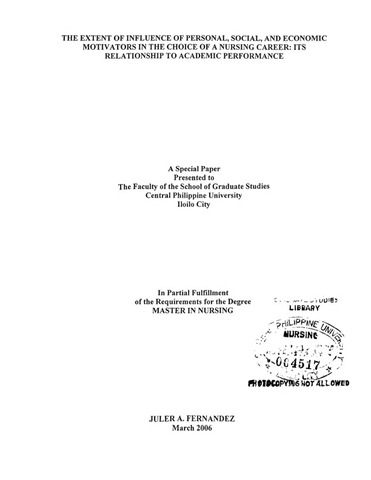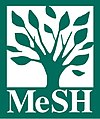The extent of influence of personal, social, and economic motivators in the choice of a nursing career: Its relationship to academic performance
Abstract
This study was conducted to determine the extent of influence of personal, social and economic motivators on the choice of a nursing career and its relationship to academic performance among the nursing students of Aklan Polytechnic Institute, Kalibo, Aklan.
A descriptive relational study was employed using one-shot survey design. The data from the 71 nursing students- respondents were gathered through self-administered questionnaires.
Major Findings of the Study
Majority of the nursing students of Aklan Polytechnic Institute were females and permanently residing in the barangay. Their parents reached college level, were unemployed and belonged to an average family income of Php 12, 471.83.
The major reasons of the students why they enrolled in nursing course are: they wanted to go abroad, to attain higher education; to earn money and the belief that nursing is in demand.
The nursing students had “high to very high” personal desire to go abroad someday. They feel that they have the ability to care and serve people, and they possess the required personality and skills to be a good nurse.
In relation to social motivation in the choice of nursing career, the data show that the students’ family had “high to very high” influence, while relatives and friends had “no or slight” influence on their decision to take up nursing.
Economic motivation has “high to very high” influence on students’ decision to take up nursing particularly their desire to help their family in terms of health and financial matters, have a secured future and stable job, and to have capital to put up family business in the future.
The nursing students had this “average” academic performance. Since more than half (53.5 percent) of them obtained a grade point average (GPA) ranging from 2.0 - 2.49, which is classified as “average” in this study.
Relational analysis revealed that sex, and residence is not significantly related to the extent of influence of personal, social, and economic motivators on students’ decision to take up nursing.
No significant relationship was also found between monthly family income and extent of influence of personal, social, and economic motivators.
On the other hand, sex and occupational status of mothers were found to be significantly related with academic performance but occupational status of students’ fathers and monthly family income were not.
Finally, the extent of personal, social, and economic motivators on the students’ decision to take up nursing and academic performance was found to have no significant relationship.
Conclusion
Based on the findings of the study, the following conclusions were made:
1. Females dominated nursing students in Aklan Polytechnic Institute, permanently residing in the barangay with well-educated parents but unemployed having a little over ten thousand monthly family income.
2. Most of nursing students recognize their course as passport for going abroad, and earning money.
3. Their choice of a nursing career is greatly influenced by their personal desire to go abroad someday, their family’s choice, and their desire to help their family in terms of health and financial matters.
4. Most of the nursing students have average academic performance. This level of performance is not significantly related to their sex, residence, and the extent of influence of personal, social, and economic motivators.
5. Occupational status of students’ fathers had no significant relationship with the extent of influence of personal, social, and economic motivators.
6. The relational analysis between monthly family income and the extent of influence of personal, social and economic motivators on the students’ decision to take up nursing had no association.
7. The characteristic such as sex and occupational status of mothers is significantly related with academic performance but occupational status of students’ fathers and monthly family income were not.
8. The extent of influence of personal, social, and economic motivators on the students’ decision to take up nursing had no significant relationship with academic performance.
Recommendations
Based on the findings and conclusions of the study, the following recommendations are formulated:
1. Since nursing course is in demand abroad and requirements is very competitive, schools should set standards minimum requirements on qualities and attributes to the students who will be admitted to Bachelor of Science in Nursing (BSN) program which include battery of psychological test such as interest, aptitude, and I.Q.; personal qualities such as appearance, grooming and personality traits. This may help students aware of the entry requirements in their application for work both in domestic and abroad.
2. Students should also be properly guided that their profession is not only to earn dollars but they should also be concerned of services in the community.
3. Since the majority of the respondents obtained an average level of academic performance, they should be given preferential attention by the teachers concerned to improve their level of academic performance into high or very high level.
4. Academic and major courses should be strengthened to enable the students easily pass the board examination. The school head should see to it that the instructor assigned to teach the skills based subject possess the necessary skills and expertise.
5. In the choice of career, parents should allow their children to decide on what course to take. They should guide and support the aspiration of their children in choosing their vocation in the future.
6. Parents of nursing students should be oriented that nursing course is generally costly and therefore, they must financially support the students. Parents are encouraged to be gainfully employed or self-employed to sustain the financial needs of their children.
7. Working mothers should provide quality time for their children to follow up their assignments, class schedules, review classes and other related activities. In doing so, they can provide guidance and direction for their children to improve his or her performance in school.
8. Researches may be continuously conducted to generate current data on the extent of influence of personal, social, and economic motivators in the choice of a nursing career of the nursing students. The result of this study may be used as reference for redirection and development of new strategies, especially on the BS Nursing program.
Description
Abstract only
Suggested Citation
Fernandez, J. A. (2006). The extent of influence of personal, social, and economic motivators in the choice of a nursing career: Its relationship to academic performance (Unpublished Master's special paper). Central Philippine University, Jaro, Iloilo City.
Type
ThesisSubject(s)
Keywords
Department
School of Graduate StudiesDegree
Master in NursingShelf Location
GSL Theses 610.73072 F391
Physical Description
xii, 73 leaves
Collections
- Master in Nursing [37]




